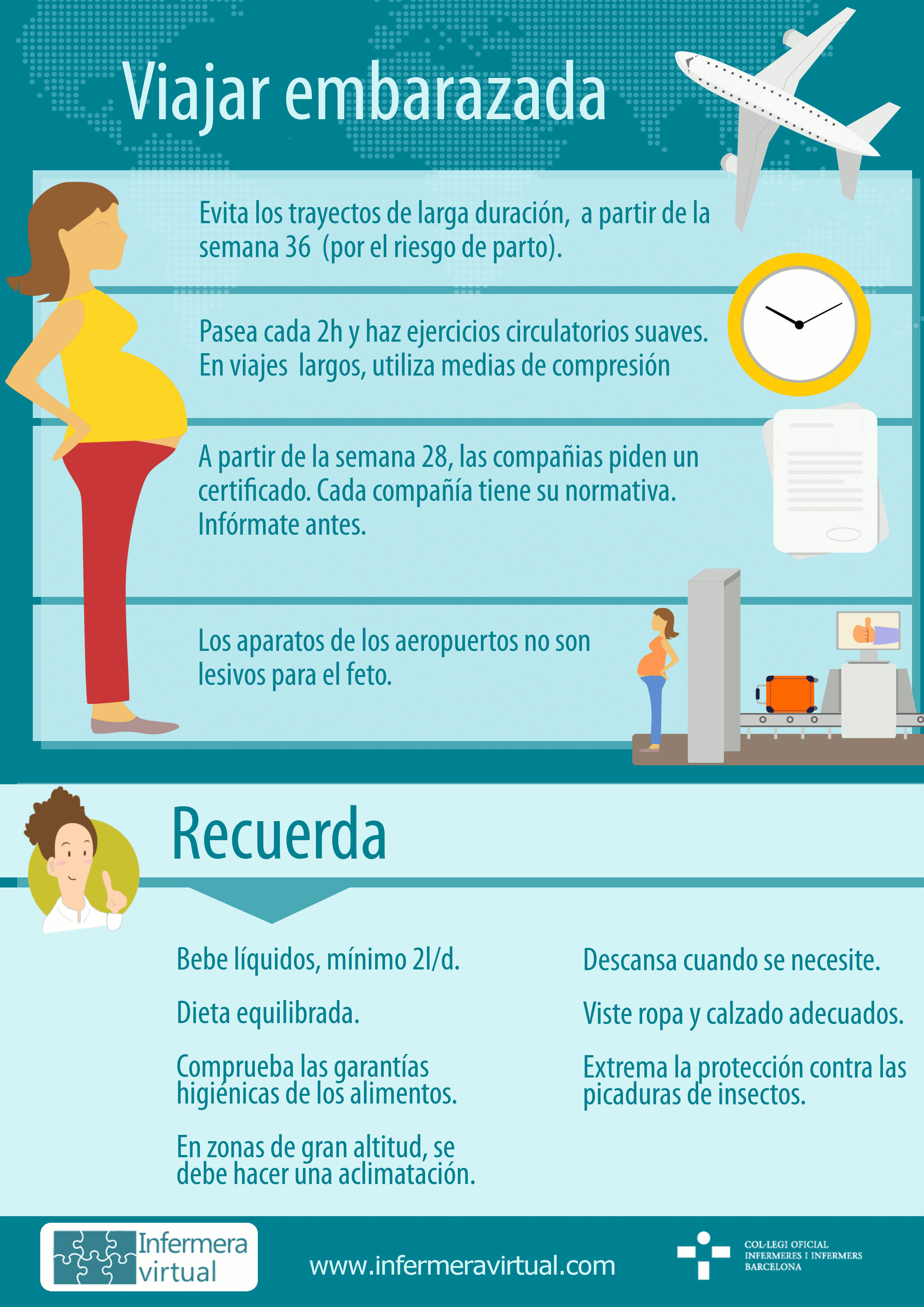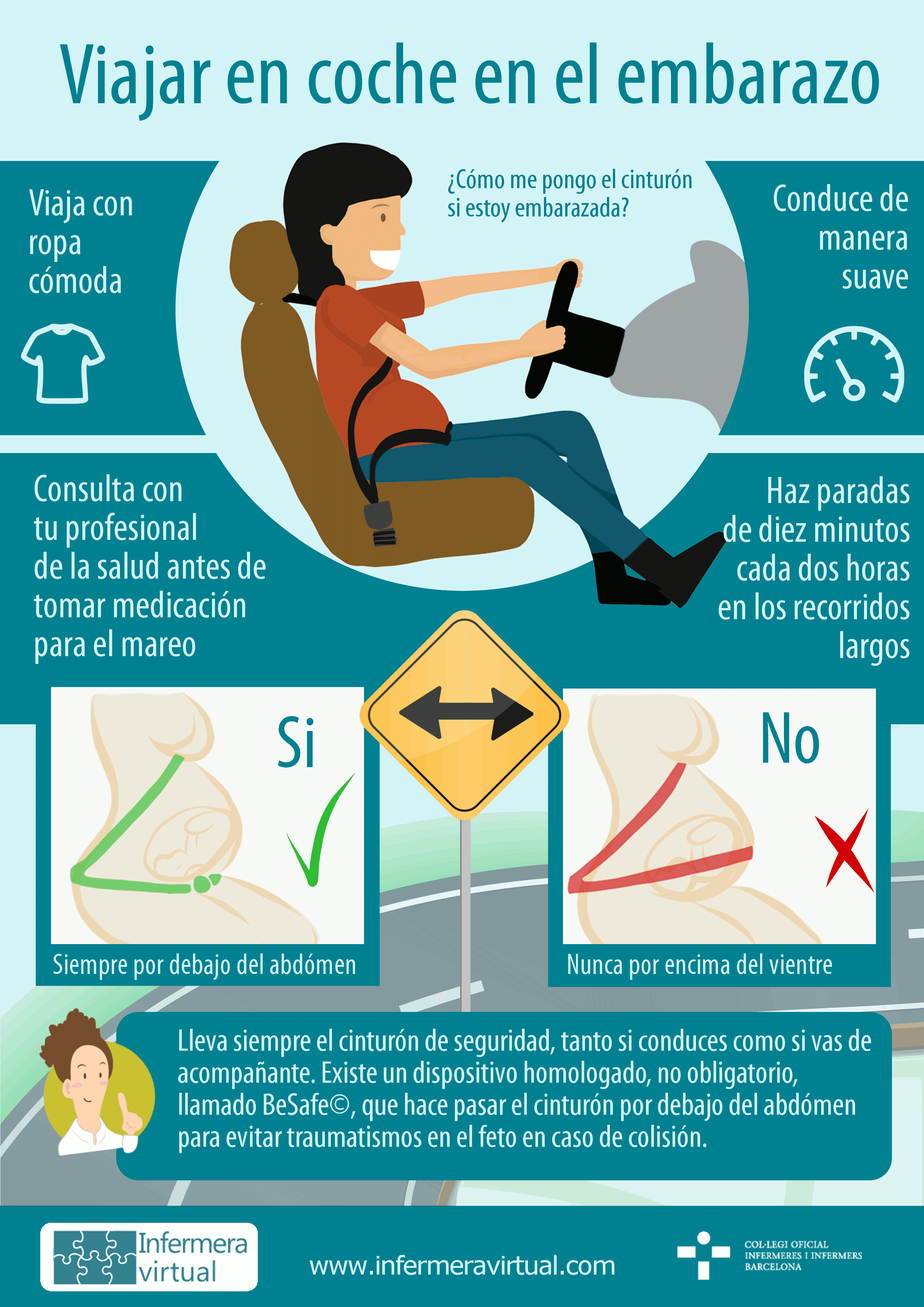Travel and the different life situations
Lee the complete content in Infermera Virtual
1. To travel during the pregnancy

In general, the pregnancy does not suppose no impediment in order to be able to travel, but yes that, in addition to follow the general guidelines, it suits to take into account following recommendations to avoid health risks, both of the woman and of the fetus.
Specific preventive measures.
- Drink many liquids, at least two litres a day, in countries or periods with heat.
- Maintain a balanced diet provided that circumstances of the trip allow it.
- Check that liquids and foodstuffs have hygienic guarantees.
- If is travelled to areas with great altitudes, it is necessary to do always a previous acclimatisation.
- Do breaks that they are necessary.
- Take comfortable and chocked clothes suitable to the temperature of the country and to characteristics of the trip.
- Maximise protective measures against insect bites to avoid some illnesses' contagion.
- Know available health resources of the country of destination
Download you the infographic, you can use her in your work centre
Means of transport.
According to the means of transport used, the pregnant woman has to follow some specific precautions.
Avión
- Avoid long-term journeys, women with simple pregnancies starting from the week 36 and women with multiples starting from the week 32 (for the risk in labour), and during seven days subsequent to the childbirth.
- Starting from the week 28, the majority of companies request a signed certificate for a health professional that it certifies that the pregnant woman has not presented no health problem up till then and where it appears the estimated date of the childbirth.
- The risk of exhibition to atmospheric radiations is very low both for the fetus and for the mother.
- Radiations of the airports' electronic devices are not damaging for the fetus.
- The risk of suffering tromboembolismos in an expectant woman with no health problem is very low, however, it is recommended to stroll every two hours, at least, and to do mild circulatory exercises.
- Use comfortable clothes and footwear (wide and chocked clothes that you can take out easily); if the trip is very long, to use stockings of compression.
- There are no international regulations for the pregnant woman that it travels in plane, but every company has its own rules. Thus, then, it will be necessary to learn more about before contracting the trip.

Car
- Take always the seat belt, so much if the pregnant woman drives as though it is the companion. Currently, there is a streamlined device, not compulsory, so-called BeSafe©, that it does to happen the belt under the abdomen to avoid abdominal physical injuries in the event of collision.
- Travel always with comfortable clothes that it does not press.
- Do stops of ten minutes every two hours in the long routes.
- Not taking medication for the dizziness, if the practitioner does not authorise it.
- Drive in a mild way.
Download you the infographic, you can use her in your work centre.
Train
The train is an ideal means of transport for the pregnant woman, since it can stroll, relax (without being pending the traffic), to eat, to drink and to go to the bathroom times that it suits.
Ship
- The pregnancy does not suppose no impediment to travel by boat, but it is necessary to know the regulations specific to the company in which is travelled.
- Travel by boat during the first quarter of pregnancy can aggravate typical nauseas and vomits of this period.
Vaccinations
During the pregnancy you can manage some vaccinations, but some are contraindicated, therefore, is significant consult in the health centre or in the centre of international vaccinations what vaccinations they can be necessary and to do an assessment customised.
Malaria or malaria. It is significant to do prevention of this illness in trips to areas where it is an usual pathology, since complications can be graver during the childhood. It is significant to maximise prevention measures of the mosquito's insect bites; it suits consult in the health centre or in the centre of international vaccinations, to consider of way customised what type of medication preventive he must follow.
2. To travel with a chronic health problem
In general, to have a chronic health problem, as, for example, diabetes, does not suppose no impediment in order to be able to travel, but yes that, in addition to follow the general guidelines, it is significant to take into account following recommendations to avoid health risks.
Specific preventive measures
- Before the trip, to do a previous visit to the nurse or to the practitioner, in order to advise of possible modifications or adjustments in the treatment of disease during the trip.
- Provided that is possible, to travel when the illness is in a controlled phase, since, changes of schedule, of habits in the diet and in the break, changes in the climate or the altitude, or frequent trips, would be able to cause more alterations to the person.
- People with health problems as diabetes, the dislipemia (high cholesterol) or the high blood pressure that, as part of the processing, they must follow some habits of specific diet, is significant that they maintain them during all the trip.
- Take the explanatory medical report of the chronic health problem in the language of the country of destination or of the countries of traffic, in case it is necessary the healthcare.
- If a drug therapy is followed, it is necessary to take twice the the medication, distributed in different spaces of the luggage, in case a part is lost.
- Know the generic component of the medication, in order to be able to achieve medications if necessary.
- People with environmental allergies, as, for example, to the pollen, they must learn more about the country's seasonal period of destination.
- Querypreviously the location of the health centres or hospitals next in the destination point.
Means of transport
According to the means of transport used, the person with a chronic health problem has to follow some specific precautions.
Avión:
- Take the explanatory medical report of the chronic health problem in the language of the country of destination or of the countries of traffic, to present it in the airport in following cases:
- when, in the hand luggage, runs away with medication, medical equipment or syringes and needles.
- when run away with metallic devices, as, for example, an artificial artificial limb or a pacemaker, to avoid problems or alterations at the time of to involve scans of the controls of security.
3. To travel with disability
In general, to have a disability does not suppose no impediment in order to be able to travel, but yes that, in addition to follow the general guidelines, it is significant to take into account following recommendations to avoid health risks.
Specific preventive measures
- Organise and adapt the trip to needs of each person according to the type and of the disability rate, in order to being able to enjoy it as the rest of travelers.
- Request information to airline companies, maritime, of railways or road transport, to airports, harbors, train or bus stations, on technical assistances or human for people with physical disability and mental, with the aim of providing displacements in the place of origin, of destination or during the traffic between destinaciones; also it is significant to find out about the possibilities of a service of accompaniment.
- People that need a wheelchair to get around must learn more about adapted accesses in the country of destination.
- People with mental disabilities, they must take an identification in a visible space, so that the tutor or the person or responsible company can them to find if are lost.
4. To travel in the childhood
Specific preventive measures
- Drink abundant liquids in countries or areas in which does heat or there is a high humidity, since children are miffier to the dehydration.
- Control the conditions of hygiene and healthiness of liquids and foodstuffs, also, suits to avoid the raw foodstuffs, for the risk of diarrheas and for the danger of dehydration.
- Have special care with extreme climatic conditions: the heat and the cold intense and usual changes in temperature. It is necessary to take suitable clothes: transpirable and of natural fabrics for the heat and warm clothes for the cold one.
- Take a hat and solar protection of a tall factor, in areas or in periods of heat and in the sun, and also for trips to the beach or to the mountain during the summer, to avoid heatstrokes and sunscalds.
- It is not recommendable that the boy plays with animals, although are domestic, since they can bite or to broadcast some illnesses.
Means of transport
According to the means of transport used, they must take some specific precautions with children.
Avión:
- Children can travel starting from the week years-old.
- During the takeoff and the touchdown of the plane, to give the chest or the feeding bottle to the sucklings, to reduce or avoid caused nuisances and earache for pressure changes in the booth of the plane.
- Drink frequently, since children are miffier to the dehydration.
Car:
- Use the seat of security adapted to the age and to the weight of the boy.
- Adjust the temperature of the car between 20-22 ºC.
- Put a visor in the windows to avoid the direct sun.
- Do frequent stops during long journeys.
- Drink frequently, since children are miffier to the dehydration.
- Take a toy so that the boy is distracted.
Vaccinations
- Have the calendar of systematic vaccinations child updated.
- Query, in the health centre or in a centre of international vaccinations, to consider of way customised the necessary vaccinations according to characteristics of the trip and the characteristics of the boy that it travels.
- Take the card of vaccinations during the trip.
Malaria or malaria
It is significant to do prevention of this illness in trips to areas where it is an usual pathology, since complications can be graver during the childhood. It is significant to maximise prevention measures of the insect bites of mosquito; it is necessary consult to the health centre or to the centre of international vaccinations, to consider of way customised what type of preventive medication he must follow according to the weight, the age and the characteristics of the boy that it travels.
5. To travel in the old age
In general, during the old age there is no problem in order to be able to travel, but yes that, in addition to follow the general guidelines, it is significant to take into account following recommendations to avoid health risks.
Specific preventive measures.
- Have precaution in the trips to areas with great altitudes and without previous acclimatisation.
- Drink frequently in trips to countries or areas with high temperatures, since, during the old age is been miffier to the dehydration, reason why with the age the thirst sensation is reduced.
- Program the trip so that it has spaces and enough time for the break.
